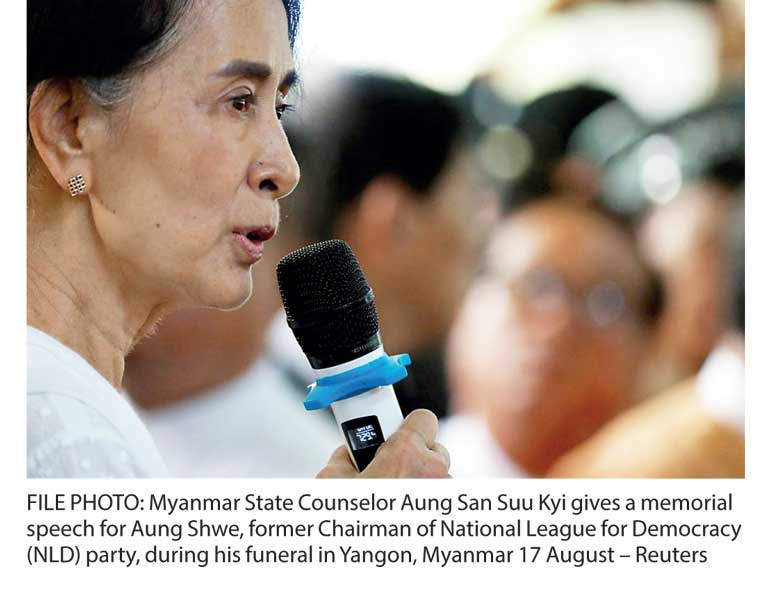Wednesday Feb 25, 2026
Wednesday Feb 25, 2026
Wednesday, 6 September 2017 00:00 - - {{hitsCtrl.values.hits}}
 Cox’s Bazar, Bangladesh/Dhaka (Reuters): Myanmar leader Aung San Suu Kyi has come under pressure from countries with large Muslim populations including Bangladesh, Indonesia and Pakistan to stop violence against Rohingya Muslims after nearly 125,000 of them fled to Bangladesh.
Cox’s Bazar, Bangladesh/Dhaka (Reuters): Myanmar leader Aung San Suu Kyi has come under pressure from countries with large Muslim populations including Bangladesh, Indonesia and Pakistan to stop violence against Rohingya Muslims after nearly 125,000 of them fled to Bangladesh.
Indonesian foreign minister met the Nobel Peace Prize laureate and Myanmar army chief Min Aung Hlaing on Monday to call on Myanmar to halt the bloodshed. The minister, Retno Marsudi, was due in the Bangladeshi capital, Dhaka, on Tuesday.
“The security authorities need to immediately stop all forms of violence there and provide humanitarian assistance and development aid for the short and long term,” Retno said after her meetings in the Myanmar capital.
The latest violence in Myanmar’s northwestern Rakhine state began on Aug. 25, when Rohingya insurgents attacked dozens of police posts and an army base. The ensuing clashes and a military counter-offensive have killed at least 400 people and triggered the exodus of villagers to Bangladesh.
The treatment of Buddhist-majority Myanmar’s roughly 1.1 million Muslim Rohingya is the biggest challenge facing Suu Kyi, who has been accused by Western critics of not speaking out for the minority that has long complained of persecution.
Myanmar says its security forces are fighting a legitimate campaign against “terrorists” responsible for a string of attacks on police posts and the army since last October.
Myanmar officials blamed Rohingya militants for the burning of homes and civilian deaths but rights monitors and Rohingya fleeing to neighboring Bangladesh say the Myanmar army is trying to force Rohingya out with a campaign of arson and killings.
“Indonesia is taking the lead on this and ultimately there is a possibility of ASEAN countries joining in,” H.T. Imam, political adviser to Bangladesh Prime Minister Sheikh Hasina, told Reuters, referring to the 10-member Association of South East Asian Nations, of which both Myanmar and Indonesia are members. “If we can keep the pressure on Myanmar from ASEAN, from India as well, that will be good.”
Indian Prime Minister Narendra Modi begins a visit to Myanmar later on Tuesday, during which he is due to meet top officials, including Suu Kyi.
“PM Modi is going there and our foreign secretary has already briefed the foreign secretary of India on this. If international conscience is awakened then that would put pressure on Myanmar,” said H.T. Imam.
The latest estimate of the number of people who have crossed the border into Bangladesh since Aug. 25, based on calculations by U.N. workers on the Bangladeshi side, is 123,600.
That takes to about 210,000 the number of Rohingya who have sought refuge in Bangladesh since October, when Rohingya insurgents staged much smaller attacks on security posts, triggering a major Myanmar army counteroffensive and sending about 87,000 people fleeing into Bangladesh.
The new arrivals - many sick or wounded with burns or bullet wounds - have strained aid agencies and communities already helping hundreds of thousands of refugees from previous spasms of violence in Myanmar.
Pakistani Foreign Minister Khawaja Muhammad Asif expressed “deep anguish at the ongoing violence against the Rohingya Muslims” and urged the Organization of Islamic Cooperation to take “immediate and effective action to bring an end to all human-rights violations against innocent and unarmed Rohingya Muslim population”.
Pakistan is home to a large Rohingya community.
Malala Yousafzai, the youngest winner of the Nobel Peace Prize, on Monday called on Suu Kyi to condemn the “shameful” treatment of the Rohingya, saying “the world is waiting” for her to speak out.